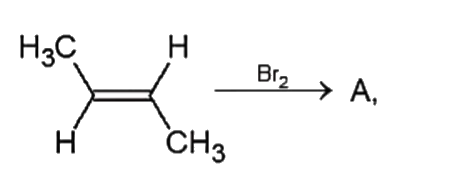Which of the following statements is true ?
Dimethyl ether is a better Lewis base than disilyl ether (SiH3−O−SiH3)
(CH3)3C−O−H is less acidic than (CH3)3Si−O−H
Both the statements (A) and (B) are true
Both the statements (A) and (B) are false
To determine which of the statements is true, we will analyze each statement regarding Lewis basicity and acidity.
Step 1: Analyze the first statement
Statement A: "Diethyl ether is a better Lewis base than disilyl ether."
1. Identify the structures:
- Diethyl ether: CH3CH2OCH2CH3
- Disilyl ether: SiH3O−SiH3
2. Understand Lewis basicity:
- A Lewis base is a species that can donate an electron pair to a Lewis acid.
- The availability of the lone pair on the oxygen atom is crucial for determining Lewis basicity.
3. Evaluate the lone pairs:
- In diethyl ether, the lone pair on the oxygen is localized and readily available for donation.
- In disilyl ether, the lone pair on the oxygen can be delocalized into the empty d-orbitals of silicon, making it less available for donation.
4. Conclusion for Statement A:
- Since the lone pair in diethyl ether is more available for donation compared to that in disilyl ether, diethyl ether is indeed a better Lewis base than disilyl ether.
- Statement A is true.
Step 2: Analyze the second statement
Statement B: "CH3 whole thrice COOH is less acidic than CH3 whole thrice SiOH."
1. Identify the structures:
- CH3COOH (acetic acid)
- CH3SiOH (silicon alcohol)
2. Understand acidity:
- Acidity is determined by the stability of the conjugate base formed after deprotonation.
- A more stable conjugate base corresponds to a stronger acid.
3. Evaluate the conjugate bases:
- For acetic acid, the conjugate base is CH3COO−.
- For silicon alcohol, the conjugate base is CH3SiO−.
4. Stability of conjugate bases:
- The conjugate base of acetic acid does not have resonance stabilization.
- The conjugate base of silicon alcohol can utilize back-bonding with the empty d-orbitals of silicon, providing resonance stabilization.
5. Conclusion for Statement B:
- Since the conjugate base of silicon alcohol is more stable due to resonance, silicon alcohol is more acidic than acetic acid.
- Hence, Statement B is true: CH3COOH is indeed less acidic than CH3SiOH.
Final Conclusion
Both statements A and B are true. Therefore, the correct answer is that both statements are true.
---
Statement A: "Diethyl ether is a better Lewis base than disilyl ether."
- Diethyl ether: CH3CH2OCH2CH3
- Disilyl ether: SiH3O−SiH3
- A Lewis base is a species that can donate an electron pair to a Lewis acid.
- The availability of the lone pair on the oxygen atom is crucial for determining Lewis basicity.
- In diethyl ether, the lone pair on the oxygen is localized and readily available for donation.
- In disilyl ether, the lone pair on the oxygen can be delocalized into the empty d-orbitals of silicon, making it less available for donation.
- Since the lone pair in diethyl ether is more available for donation compared to that in disilyl ether, diethyl ether is indeed a better Lewis base than disilyl ether.
- Statement A is true.
Statement B: "CH3 whole thrice COOH is less acidic than CH3 whole thrice SiOH."
- CH3COOH (acetic acid)
- CH3SiOH (silicon alcohol)
- Acidity is determined by the stability of the conjugate base formed after deprotonation.
- A more stable conjugate base corresponds to a stronger acid.
- For acetic acid, the conjugate base is CH3COO−.
- For silicon alcohol, the conjugate base is CH3SiO−.
- The conjugate base of acetic acid does not have resonance stabilization.
- The conjugate base of silicon alcohol can utilize back-bonding with the empty d-orbitals of silicon, providing resonance stabilization.
- Since the conjugate base of silicon alcohol is more stable due to resonance, silicon alcohol is more acidic than acetic acid.
- Hence, Statement B is true: CH3COOH is indeed less acidic than CH3SiOH.
Both statements A and B are true. Therefore, the correct answer is that both statements are true.
Topper's Solved these Questions
- p-BLOCK ELEMENTS-1Book:VMC MODULES ENGLISHChapter:p-BLOCK ELEMENTS-1Exercise:JEE Main Archive
Explore 34 Videos
- p-BLOCK ELEMENTS-1Book:VMC MODULES ENGLISHChapter:p-BLOCK ELEMENTS-1Exercise:JEE Advanced Archive
Explore 48 Videos
- p-BLOCK ELEMENTS-1Book:VMC MODULES ENGLISHChapter:p-BLOCK ELEMENTS-1Exercise:LEVEL 1
Explore 75 Videos
- MOCK TEST 9Book:VMC MODULES ENGLISHChapter:MOCK TEST 9Exercise:CHEMISTRY (SECTION 2)
Explore 5 Videos
- PERIODIC PROPERTIES OF ELEMENTSBook:VMC MODULES ENGLISHChapter:PERIODIC PROPERTIES OF ELEMENTSExercise:IMPECCABLE
Explore 50 Videos
Similar Questions
Knowledge Check
Which of the following statement is true?
Avessels are multicellular and with wide lumenBtracheids are multicellular and with narrow lumenCvessels are unicellular and with narrow lumenDtracheids are unicellular and with wide lumen.Which of the following statement is true?
AElectrostatic force is a conservative force.BPotential at a point is the work done per unit charge in bringing a charge from any point to infinity.CElectrostatic force is non-conservative.DPotential is the product of charge and work.Which of the following statement is true?
AWhen an aqueous solution of NaCI is electrolysed, sodium metal is deposited at cathode.BThere is no difference between specific conductivity and molar conductivity.CSilver nitrate solution can be stored in a copper container.DThe addition of liquid bromine acid, the following process is possible at anode.


